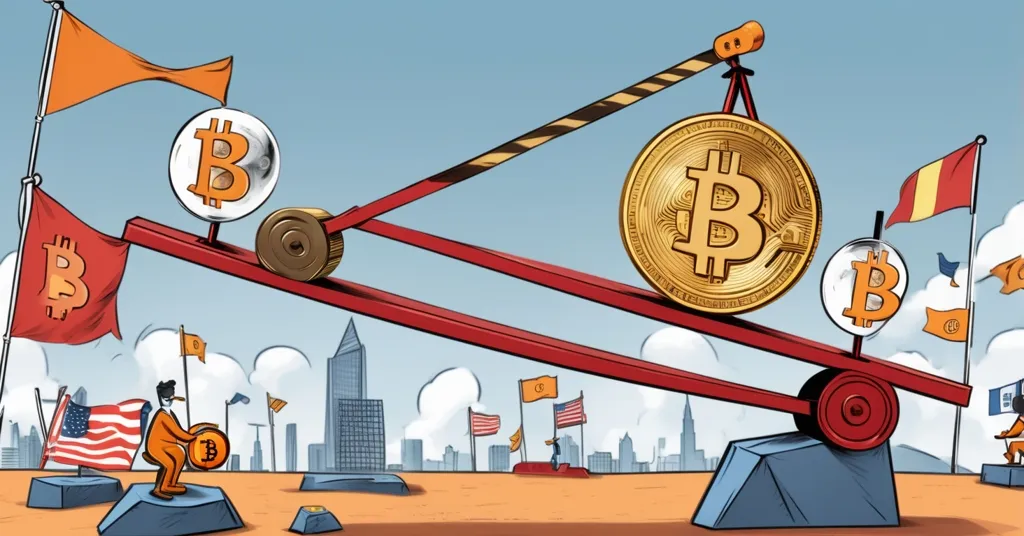South Korea Rejects Bitcoin Reserves, Echoing Global Central Bank Caution

South Korea Joins Global Choir in Rejecting Bitcoin Reserves Amid Crypto Enthusiasm
On March 17, 2025, South Korea’s central bank, the Bank of Korea, announced its rejection of Bitcoin as a reserve asset, citing the cryptocurrency’s notorious volatility. Despite the country’s vibrant crypto scene, this decision aligns with global trends where other major central banks have expressed similar reservations.
- Bank of Korea rejects Bitcoin reserves due to high volatility.
- South Korea remains crypto-friendly despite the central bank’s stance.
- Global central banks share similar reservations about Bitcoin.
- Brazil and the Czech Republic show more openness to Bitcoin.
- U.S. experiments with a Strategic Bitcoin Reserve.
The Bank of Korea’s representative succinctly captured their decision, stating,
“The BTC price trajectory resembles a roller coaster.”
This means Bitcoin’s value can go up and down dramatically in a short period, making it risky for stable financial planning. This volatility, they argue, undermines Bitcoin’s ability to serve as a stable reserve asset, a sentiment shared across the globe. From the European Central Bank to the Swiss National Bank, and even the Bank of Japan, central bankers are singing in harmony, citing volatility, liquidity, and the cryptocurrency’s incompatibility with their existing financial systems as reasons for keeping Bitcoin at arm’s length.
Yet, in the land of kimchi and K-pop, where nearly half of the population in their 30s dabbles in cryptocurrencies, the rejection of Bitcoin as a reserve asset might seem counterintuitive. South Korea has embraced crypto with open arms, featuring regulated exchanges and zero taxation on crypto capital gains. Zero taxation on crypto capital gains means that profits from trading cryptocurrencies are not taxed, making it more attractive for investors. The contrast between the public’s enthusiasm and the central bank’s caution is stark, illustrating the balance between innovation and stability in the financial sector.
South Korea’s Crypto Environment
South Korea’s crypto-friendly environment is influenced by its long history with micropayments and the presence of major crypto exchanges like Upbit and Bithumb. A recent survey from March 2025 shows a 52.6% increase in crypto investors, reaching 9.66 million, with a significant portion being over 50 years old. This generational shift towards cryptocurrencies reflects a broader societal engagement and a quest for financial independence amidst political and economic uncertainties.
Global Bitcoin Reserve Policies
Globally, the story isn’t much different. Christine Lagarde, the ECB President, echoed the sentiment of many when she declared,
“Bitcoin is unfit for the ECB reserve as it lacks enough safety and liquidity.”
Safety and liquidity refer to the stability and ease of converting an asset into cash without affecting its market price. Similarly, Martin Schlegel of the Swiss National Bank dismisses Bitcoin as a “niche phenomenon,” while Michele Bullock, the Australian Reserve Bank governor, went as far as to say,
“It’s not money, Bitcoin has no role in the Australian economy.”
These statements highlight a broader lack of understanding or acceptance of Bitcoin among traditional financial institutions.
However, not all countries are singing the same tune. Brazil and the Czech Republic have shown a willingness to experiment with Bitcoin reserves, suggesting a potential shift in the global narrative. The Czech Republic’s openness stems from its progressive approach to digital assets, while Brazil is exploring Bitcoin as a hedge against economic instability. Meanwhile, the United States has boldly taken a step into the crypto reserve space with its Strategic Bitcoin Reserve, a national stockpile of Bitcoin for economic strategy. This move positions the U.S. as a leader in exploring digital assets, though it has not yet spurred a domino effect globally.
Counterpoints and Bitcoin’s Potential
Amidst this backdrop, Bitcoin proponents are quick to point out what they see as a myopic view from central banks. One such advocate took to X (the platform formerly known as Twitter) to express their frustration, stating,
“Betting against Bitcoin in 2025 is like shorting the Internet in 2000.”
This sentiment underscores a belief that rejecting Bitcoin now might be akin to missing out on a major technological shift, a perspective that resonates with the crypto community’s faith in the currency’s long-term potential. Michael Saylor, a prominent Bitcoin advocate, has emphasized the importance of Bitcoin for leading countries in his speeches, highlighting its potential as a strategic asset.
The increasing institutional capital flows into crypto, particularly in Asia, as noted by Jess Zeng, the mETH protocol ecosystem lead, could further influence central bank policies. This trend suggests that even if Bitcoin isn’t currently seen as a reserve asset, its growing acceptance by institutions might eventually sway the narrative.
Regulatory Needs and Future Implications
South Korea’s Councilman Ahn Do-Jae stresses the need for a minimum regulatory framework to protect investors, especially given the growing number of older investors. Rep. Lim Kwang-hyun points out the need for thorough measures at a pan-governmental level to enhance the stability of the crypto market and protect investors’ rights. These insights highlight the importance of balancing the adoption of cryptocurrencies with robust regulatory measures to safeguard investors.
As Bitcoin continues to evolve, it remains to be seen whether central banks will reconsider their stance and integrate it into their reserve strategies. The potential long-term impacts of rejecting Bitcoin as a reserve asset could range from missed opportunities in technological advancement to shifts in global economic power dynamics.
Key Questions and Takeaways
- Why did the Bank of Korea reject Bitcoin as a reserve asset?
The Bank of Korea rejected Bitcoin due to its high volatility and inability to guarantee a stable value in Korean won, failing to meet the criteria for a reserve asset.
- How does South Korea’s crypto environment influence its decision on Bitcoin reserves?
Despite being a crypto-friendly nation with high crypto adoption rates, South Korea’s central bank remains cautious, indicating that its decision is not driven by a general aversion to cryptocurrencies but by specific concerns about Bitcoin’s suitability as a reserve asset.
- Which other countries have rejected Bitcoin reserves, and why?
Countries like Japan, Switzerland, and those under the European Central Bank’s jurisdiction have rejected Bitcoin reserves due to concerns about volatility, liquidity, and incompatibility with existing financial frameworks.
- Are there any countries that have shown openness to Bitcoin reserves?
Yes, Brazil and the Czech Republic have shown some level of openness to Bitcoin reserves, though they are exceptions to the broader conservative trend.
- What impact did the U.S. Strategic Bitcoin Reserve have on global crypto policy?
The U.S. creation of a Strategic Bitcoin Reserve did not significantly influence the global crypto market or prompt immediate policy changes in other countries, highlighting a divide in approaches to cryptocurrency.
- How do Bitcoin proponents view the rejection of Bitcoin reserves by countries?
Bitcoin advocates argue that officials in rejecting countries do not fully understand Bitcoin’s potential and see rejecting it as akin to missing out on major technological shifts, like the internet in the early 2000s.
- Could Bitcoin ever become a stable reserve asset?
While Bitcoin’s current volatility presents challenges, proponents believe that with increased adoption and institutional support, it could potentially stabilize enough to be considered a reserve asset in the future.
- What are the implications of a Strategic Bitcoin Reserve?
A Strategic Bitcoin Reserve could signal a country’s confidence in digital assets, potentially influencing global crypto policies and fostering greater acceptance of Bitcoin as a legitimate economic tool.
This global reluctance to embrace Bitcoin as a reserve asset, even in crypto-friendly nations like South Korea, highlights the tension between the potential of decentralized technologies and the need for stability in traditional financial systems. As we move forward, the world will be watching closely to see if this stance shifts, or if Bitcoin continues to carve out its niche outside the traditional reserve framework.



